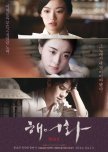Esta resenha pode conter spoilers
“The song that I madly, deeply wanted to sing... That song should've been mine.”
It's been exactly 3 weeks since I completed this movie, and I've made sure that I'm not emotionally attached or blindingly giving full scores. I can't find any fault in this piece, still. I never had such a hard time trying to put my amazement into words. I hate to spoil or guide you to view this film in a certain way, but I believe that the synopsis and the trailer are already a huge spoiler, so here's my attempt to elaborate:
Let me tell you first that this is not a “journey to stardom” kind of music movie or a story about two girls pulling each other's hair and fighting over a guy. Of course it does revolve around the themes of music and jealousy, but there are more to this than just being another love triangle story between musicians.
There is an absolute charm to how its English title accurately describes what this film has to offer. “Love, Lies” speaks for its entire composition: 50% hope and 50% despair, and I don't say that lightly; this film boldly runs for 1 hour telling the story of love, friendship, hope and dreams while building up the tension, then, later at its 50% mark, turns into a story of lies, jealousy, betrayal and broken heart for another hour. It also wraps up with guilt and consequences at the end, leading you to fully sympathize with every decision made by the main character no matter how crooked she’s become.
The setting in 1943-1945, the very end of Japanese occupation era in Korea, was fully utilized here and it intertwined so well with the music theme. It was the last two years that “gisaengs” existed. It was the most modern period of those Japanese backdrops. Also, Korea's liberation at the end of the story plays a good part. Here is where it could become difficult for some people to give this film a high score; the movie does require a little understanding of “musician mindset”.
Music is a form of art, and by art, it means there's no correct answer. It’s very subjective and personal. One may view music as something suitable for high class, but on the other hand it’s never wrong to think that music should belong to people in every social status. This conflict will set lover conflicts in motion in the story. So, think: What if your musician lover prefers someone else’s voice rather than yours? It’s unfavorable, but it’s not wrong, right?
Because the man in question is a musician – a pop music composer, it somewhat allows his unfavorable choices to slip through. It’s quite a given that his mind does not (need to) function entirely logically. He makes choices based on his artistic hunch. When he, according to the synopsis, “falls in love” with his girlfriend’s best friend, I came to fully accept the fact, although I didn’t support his decision either. And that was just one of the many reasons I loved how thoroughly planned the writing for this film was.
The Korean title for this movie “Hae-eo-hwa” is another old term for “gisaeng”, women who received high education in music to perform in front of and entertain men of high social status. “Hwa” means flower, so “haeeohwa” also means “a flower that understands human’s words”. The term represents how women (gisaengs) were treated as social inferior. This “haeeohwa” theme plays a big part in the film more than just suggesting the leads’ profession. One woman is willing to follow the guidance of a man she loves, and another goes against her own beliefs and throws herself at another man to gain power to take back what she loves.
All of these are combined into great storytelling, and in the end, you will see for yourself whether it was the “artistic mindset”, the social derogation of women, a man’s swayed heart, a friend’s betrayal… or it was entirely something else that ruined it all.
“Why did ____ not know back then that it was good enough?”
Also, don’t forget to keep an eye on the minor character Kim Okhyang. She doesn’t appear often, but she’s another character that will leave you with many thoughts in the end.
--
I was stunned by Han Hyojoo’s acting as the sweet yet heartbroken Jung Soyul. Facial expressions were the key to this character’s portrayal, and she was utterly perfect. Casting Chun Woohee as Han Hyojoo’s best friend who needs to look and feel smaller and a bit inferior was also a great decision. Yoo Yeonseok’s laid-back demeanor was definitely suitable for his music composer role. He also deserves compliments for his months of effort in practicing piano just for this movie. Everyone including the supporting cast really made this movie come to life.
As for the music, there are plenty of music movies that fail to deliver an excellent result in the music department. This movie did not just reach my expectation but surpassed it to an exceptional level. Traditional “Jeongga” music and 1940’s trot are not what would appeal to everyone’s ears, but this movie made their music very sweet, easy to listen and memorable. For additional points, the two lead actresses performed every song themselves, and they were spectacular.
Lastly, the artistic department deserves great compliments. Locations, costumes and props were top-notch. Cinematography presented this film in vibrant colors, and the composition was beautiful from the beginning till the end. Everything was grand and aesthetically pleasing here.
I usually don’t rewatch, but I will definitely watch this one many times.
I absolutely recommend this film to everyone.
Esta resenha foi útil para você?


























